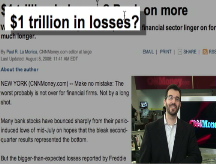The shorts are back
Effective Wednesday, naked short selling is fair game once again in the banking sector. This time, however, the financials may be spared.
 |
| Short sellers will be free to once again take on many of the big names in the financials through naked short selling starting Wednesday as SEC lifts its moratorium on the practice. |
NEW YORK (CNNMoney.com) -- Should the financial sector endure yet another harrowing period of wild market swings and rumors later this week, expect regulators to round up the usual suspects - namely, the short sellers.
The Securities and Exchange Commission's emergency order aimed at curbing so-called "naked" short selling of financials expires on Tuesday. The order applies to 17 domestic and international securities firms, along with the twin mortgage buyers Freddie Mac (FRE, Fortune 500) and Fannie Mae (FNM, Fortune 500).
Last month, regulators announced the plan as part of an effort to soothe the panic surrounding financials. At the time, many in the market were blaming short sellers, or those investors who profit when a stock goes down.
Traditional short sellers borrow stock with the aim of selling it, then buying it back at a lower price, hoping to pocket the difference.
Naked short selling, however, goes a bit further. Instead, investors short the stock without actually borrowing it, making it much easier to drive down the share price.
The consensus, however, among market experts is that the financials are unlikely to make a return to that painful period of mid-July after the ban on naked short selling is lifted.
"It has been volatile even after this went into effect," said Gerard Cassidy, managing director of bank equity research at RBC Capital Markets. "I'm not sure it will get back to where it was a month ago."
While some better-than-expected second quarter results helped temper some of the fears about the sector, the ban appeared to provide a bit of relief to financial firms that found themselves at the mercy of market chatter.
The volume of short selling in the 17 primary dealers plunged by 70% in the first day after the ban was announced, according to the market data firm S3 Matching Technologies.
Some members of the group even watched their beaten down stocks stage a recovery. Lehman Brothers (LEH, Fortune 500), for example, which was besieged by rumors about its liquidity position prior to the announcement of the ban, has seen the value of its stock climb 50% since then. Citigroup (C, Fortune 500), which was also included in the group, has seen its stock price climb 27% as Friday's close.
At times, naked short selling has been linked with market manipulation, but not always. When combined with a nasty market rumor, naked short sellers can collect a handsome profit when a company's stock falls. In effect, it is the opposite of "pump and dump" scams in which investors talk up a stock price before selling it at a handsome profit.
Some market observers have suspected that short sellers helped push Bear Stearns toward its ultimate demise in mid-March.
But they have also served as a much-needed voice of reason at times, including the dot-com era when tech stocks soared to ridiculous valuations.
Short sellers, or so-called "shorts", argue that this period is such an instance.
William Fleckenstein, a well-known "short" who serves as the president of the Seattle-based money management firm Fleckenstein Capital, argues that financials have no one to blame but themselves.
"Short sellers didn't make the stock go down, they didn't lever up the company," he said. "And they didn't lower the fed funds rate or tell people to take out ARMs [adjustable-rate mortgages] when they shouldn't have."
What's more, notes Fleckenstein, savvy investors who wanted to place a bet that a stock would fall, don't necessarily have to rely on naked short selling. Instead, they can buy "puts" on a stock, which gives the owner the right to sell shares for a certain price in the future.
Or there's always the traditional short sale.
"[Borrowing stock] is just an extra step," he said.
But short sellers may have to change the way they do business. Already, SEC Chairman Christopher Cox has floated a few suggestions about reforming short sale practices, including expanding the mid-July moratorium into a broader market-wide rule.
"What is unknown and more significant is what long-term rules the SEC plans to propose," said Gary Distell, a partner in the financial services practice at the New York-based law firm Katten Muchin Rosenman LLP, who previously served as a senior managing director at Bear Stearns.
Some experts have argued that the SEC needs to bring back the so-called uptick rule, which prohibits an investors from shorting a stock except when its price is moving higher to prevent massive selloffs, or "bear raids," on a stock. Last year, the rule was repealed.
Any changes, however, would also likely meet with much resistance from Wall Street as well as hedge funds, which rely on short selling, in part, to help produce the outsized returns they have become famous for.
Last month, the Managed Funds Association and the Coalition of Private Investment Companies, which represent hedge funds and other asset managers, warned the SEC that any permanent changes would not only limit legitimate short selling but also give an inaccurate representation of the real price of a stock.
At the same time, warned Distell, an expansion of the rule would require Wall Street firms to update their systems, resulting in higher borrowing costs for both brokers and hedge funds.
"In this time of economic downturn, that would not be a popular outcome for Wall Street," said Distell. ![]()


